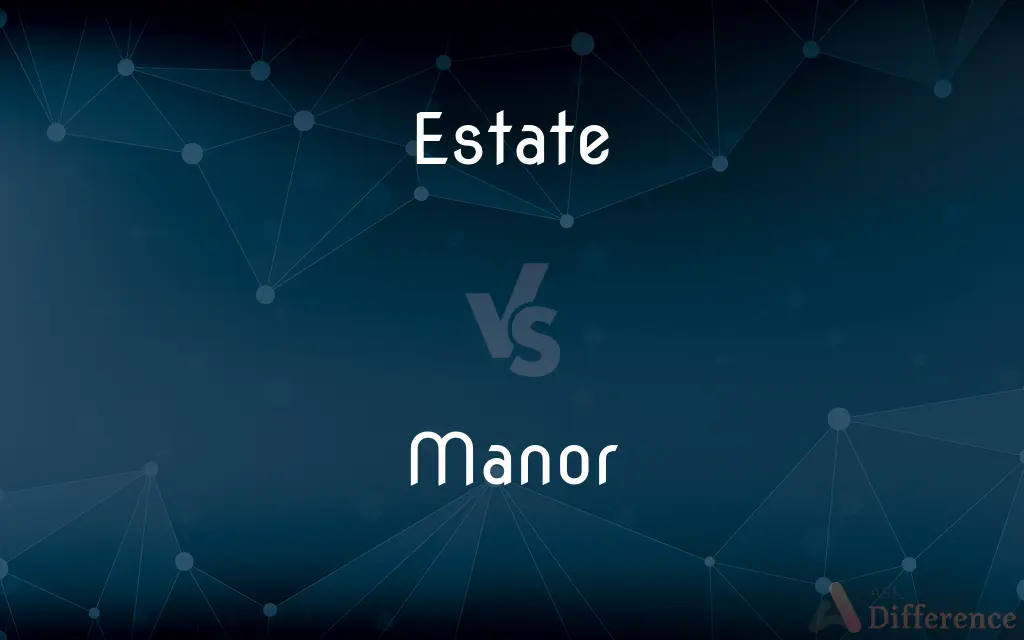Estate vs. Manor — What's the Difference?
By Tayyaba Rehman & Urooj Arif — Updated on March 21, 2024
An estate refers to a large area of land owned by an individual or family, often with various properties, while a manor is a specific type of estate historically associated with a main house and land overseen by a lord.

Difference Between Estate and Manor
Table of Contents
ADVERTISEMENT
Key Differences
Estates encompass a broad category of property, including land, buildings, and other assets owned by an individual, family, or entity. They can vary greatly in size and function, ranging from agricultural lands to residential properties. Whereas, manors specifically refer to a type of historical estate that includes a main house and surrounding lands, traditionally managed by a lord or landowner in a feudal system.
While estates can be found worldwide and are not limited by historical or feudal systems, manors are often tied to specific historical periods and geographical locations, particularly in Europe. Manors serve as a hallmark of medieval and early modern European architecture and social structure, whereas estates are recognized in both historical and contemporary contexts as representations of property ownership.
The concept of an estate is flexible and can apply to both rural and urban properties, including everything from vast agricultural lands to urban real estate holdings. On the other hand, manors are more closely associated with rural settings and the agricultural economy, reflecting their origins in the feudal system where they played a central role in local governance and economy.
Estates are typically defined by their ownership and can include multiple types of properties, such as houses, apartments, farmland, and commercial buildings. Conversely, a manor traditionally includes the lord's residence and the lands farmed by the lord's tenants, indicating a specific structure of ownership and use that is less common today.
In contemporary usage, the term "estate" often implies a degree of wealth and status, indicating significant property holdings. In contrast, "manor" evokes historical and architectural significance, often related to a specific historical period or style of living, with many manors now serving as historical sites or luxury accommodations.
ADVERTISEMENT
Comparison Chart
Definition
A large area of land and its properties owned by an individual or family.
A specific type of estate with a main house and surrounding lands, historically overseen by a lord.
Historical Context
Used broadly in both historical and modern contexts.
Tied to medieval and early modern Europe within a feudal system.
Location
Can be urban or rural, with no geographical limitations.
Primarily rural, with historical ties to specific regions, especially Europe.
Composition
Can include a variety of property types (residential, agricultural, commercial).
Centrally includes a large house and agricultural lands managed by tenants.
Cultural Connotation
Implies wealth and significant property ownership.
Evokes historical, architectural, and feudal associations.
Compare with Definitions
Estate
An estate encompasses lands and properties owned by an individual or entity.
The Smith family estate includes farmlands, forests, and two lakes.
Manor
A manor is a historical estate with a main house and surrounding lands.
The medieval manor has been preserved as a museum, showcasing feudal life.
Estate
Represents significant assets and wealth.
Her estate was valued at over $10 million, including real estate and investments.
Manor
Associated with the feudal system and lordship.
The lord of the manor had rights over the land and its tenants.
Estate
Reflects status and ownership.
The family owns an extensive estate in the countryside, complete with vineyards.
Manor
Reflects architectural and historical significance.
The manor's architecture includes original features from the 15th century.
Estate
Can be used to describe urban developments.
The new housing estate features a mix of apartments and townhouses.
Manor
Can imply luxury and historical charm in modern usage.
They stayed at a converted manor now operating as a luxury hotel.
Estate
Often involved in legal contexts, especially inheritance.
The estate was divided among the heirs according to the will.
Manor
Often found in rural settings.
Nestled in the countryside, the manor overlooks acres of farmland.
Estate
An extensive area of land in the country, usually with a large house, owned by one person, family, or organization.
Manor
A large country house with lands
A Tudor manor house in the English countryside
Kelmscott Manor
Estate
A class or order regarded as forming part of the body politic, in particular (in Britain), one of the three groups constituting Parliament, now the Lords spiritual (the heads of the Church), the Lords temporal (the peerage), and the Commons. They are also known as the three estates
The unions are no longer an estate of the realm
Manor
The district covered by a police station
They were the undisputed rulers of their manor
Estate
A particular state, period, or condition in life
The holy estate of matrimony
Programmes for the improvement of man's estate
Manor
A landed estate.
Estate
Short for estate car
Manor
The main house on an estate; a mansion.
Estate
A landed property, usually of considerable size.
Manor
A tract of land in certain North American colonies with hereditary rights granted to the proprietor by royal charter.
Estate
One's property, both real and personal, vested and contingent, especially as disposed of in a will.
Manor
The district over which a lord had domain and could exercise certain rights and privileges in medieval western Europe.
Estate
The nature and extent of an owner's rights with respect to land or other property.
Manor
The lord's residence in such a district.
Estate
Chiefly British A housing development.
Manor
A landed estate.
Estate
Social position or rank, especially of high order.
Manor
The main house of such an estate or a similar residence; a mansion.
Estate
A major social class, such as the clergy, the nobility, or the commons, formerly possessing distinct political rights.
Manor
A district over which a feudal lord could exercise certain rights and privileges in medieval western Europe.
Estate
The collective property and liabilities of someone, especially a deceased person.
Manor
The lord's residence and seat of control in such a district.
Estate
State; condition.
Manor
Any home area or territory in which authority is exercised, often in a police or criminal context.
Estate
(archaic) Status, rank.
Manor
One's neighbourhood.
Estate
(archaic) The condition of one's fortunes; prosperity, possessions.
Manor
The land belonging to a lord or nobleman, or so much land as a lord or great personage kept in his own hands, for the use and subsistence of his family.
My manors, rents, revenues, l forego.
Estate
(obsolete) A "person of estate"; a nobleman or noblewoman.
Manor
A tract of land occupied by tenants who pay a free-farm rent to the proprietor, sometimes in kind, and sometimes by performing certain stipulated services.
Estate
(historical) A major social class or order of persons regarded collectively as part of the body politic of the country and formerly possessing distinct political rights (Estates of the realm).
Manor
The mansion of the lord of the manor
Estate
(legal) The nature and extent of a person's interest in, or ownership of, land.
Manor
The landed estate of a lord (including the house on it)
Estate
An (especially extensive) area of land, under a single ownership.
Estate
The landed property owned or controlled by a government or a department of government.
Estate
A housing estate.
Estate
A station wagon; a car with a tailgate (or liftgate) and storage space to the rear of the seating which is coterminous with the passenger compartment (and often extensible into that compartment via folding or removable seating).
Estate
(obsolete) The state; the general body politic; the common-wealth; the general interest; state affairs.
Estate
(computing) An organization's collective information technology resources.
Estate
Previously owned; secondhand.
An estate diamond; estate jewelry
Estate
To give an estate to.
Estate
To bestow upon.
Estate
Settled condition or form of existence; state; condition or circumstances of life or of any person; situation.
Mind not high things, but condescend to men of low estate.
Estate
Social standing or rank; quality; dignity.
God hath imprinted his authority in several parts, upon several estates of men.
Estate
A person of high rank.
She's a duchess, a great estate.
Herod on his birthday made a supper to his lords, high captains, and chief estates of Galilee.
Estate
The state; the general body politic; the common-wealth; the general interest; state affairs.
I call matters of estate not only the parts of sovereignty, but whatsoever . . . concerneth manifestly any great portion of people.
Estate
The great classes or orders of a community or state (as the clergy, the nobility, and the commonalty of England) or their representatives who administer the government; as, the estates of the realm (England), which are (1) the lords spiritual, (2) the lords temporal, (3) the commons.
Estate
The degree, quality, nature, and extent of one's interest in, or ownership of, lands, tenements, etc.; as, an estate for life, for years, at will, etc.
Estate
To establish.
Estate
Tom settle as a fortune.
Estate
To endow with an estate.
Then would I . . . Estate them with large land and territory.
Estate
Everything you own; all of your assets (whether real property or personal property) and liabilities
Estate
Extensive landed property (especially in the country) retained by the owner for his own use;
The family owned a large estate on Long Island
Estate
A major social class or order of persons regarded collectively as part of the body politic of the country and formerly possessing distinct political rights
Common Curiosities
Can an estate include multiple properties?
Yes, an estate can include various types of properties, such as residential, agricultural, and commercial buildings.
How does a manor differ from an estate?
A manor is a specific type of historical estate that includes a main residence and surrounding lands, often within a feudal system, whereas an estate broadly refers to any significant property holdings.
What historical period do manors typically belong to?
Manors are most commonly associated with medieval and early modern European history.
Do estates have legal implications?
Yes, estates have significant legal implications, particularly regarding ownership, inheritance, and taxation.
Is a manor always part of an estate?
Yes, a manor can be considered a specific kind of estate with distinctive characteristics and historical background.
What roles did manors play in the feudal system?
Manors were central to the feudal system, serving as the administrative and economic center of a lord's lands and overseeing the agricultural production and local governance.
How is estate ownership transferred?
Estate ownership can be transferred through sale, inheritance, or legal processes such as trusts.
What is an estate?
An estate refers to a large area of land and its properties owned by an individual, family, or entity.
Are all large houses called manors?
Not necessarily; "manor" typically refers to large houses with historical and architectural significance, often tied to feudal estates.
Is there a difference in the legal treatment of estates and manors?
The legal treatment can vary by jurisdiction but generally relates to property laws, heritage preservation, and sometimes special statutes for historical properties.
Can the term "estate" apply to urban properties?
Absolutely, the term can apply to urban real estate developments and holdings, not just rural land.
Can an estate be owned by a corporation?
Yes, estates can be owned by corporations, individuals, families, or other entities.
How are manors preserved today?
Many manors are preserved as historical sites, museums, or luxury accommodations, highlighting their architectural and historical value.
What makes a property a manor in contemporary terms?
In contemporary terms, a manor often refers to a property with historical significance, architectural distinction, and traditionally, a large house with surrounding lands.
How do estates and manors contribute to cultural heritage?
Both contribute significantly to cultural heritage by encapsulating historical periods, architectural styles, and social structures, often serving as tangible links to the past.
Share Your Discovery

Previous Comparison
Ubiquitination vs. Ubiquitylation
Next Comparison
Dragged vs. DruggedAuthor Spotlight
Written by
Tayyaba RehmanTayyaba Rehman is a distinguished writer, currently serving as a primary contributor to askdifference.com. As a researcher in semantics and etymology, Tayyaba's passion for the complexity of languages and their distinctions has found a perfect home on the platform. Tayyaba delves into the intricacies of language, distinguishing between commonly confused words and phrases, thereby providing clarity for readers worldwide.
Co-written by
Urooj ArifUrooj is a skilled content writer at Ask Difference, known for her exceptional ability to simplify complex topics into engaging and informative content. With a passion for research and a flair for clear, concise writing, she consistently delivers articles that resonate with our diverse audience.















































